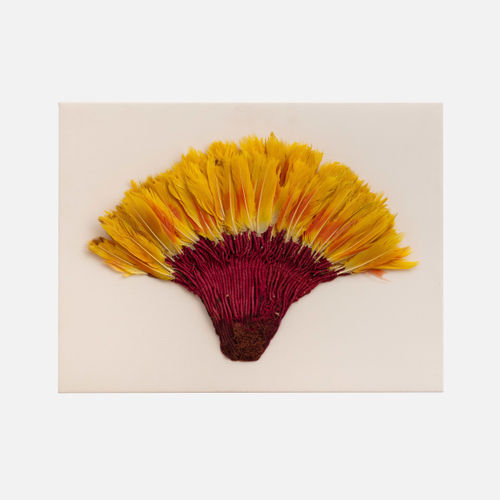Paul Hughes Fine Arts is pleased to collaborate with the Tristan Hoare Gallery in the thematic exhibition "The Conference of the Birds" a multidisciplinary group exhibition curated by Flora Hesketh and Omar Mazhar. The title is taken from Attar of Nishapur’s 12th century poem which tells the story of the wise Hoopoe leading the birds of the world on a journey in search of their ideal king, the legendary Simorgh.
Birds have fascinated humans from the beginning of time, inspiring amongst other things architecture, science, technology, poetry, opera, folklore, fairy tales, film, fashion, and of course the visual arts. Our fascination with flight, the feelings of freedom, movement, not to mention migration, are inextricably connected with birds. Birds appear in the art of every culture throughout the ages, from Neolithic cave drawings to significant roles as gods and deities in pagan religions, to symbolic representations in Christian paintings such as Piero della Francesca’s dove in The Baptism of Christ from the 15th century. In the 17th century, with hunting no longer the preserve of the nobility, paintings of birds as trophies, by artists such as Frans Snyders and others, proliferated as the upwardly mobile society of the time fuelled demand. In the 19th century, John James Audubon’s spectacular landmark work of ornithological illustration, Birds of America, follows on from the 18th century Indian masters’ paintings of birds commissioned by East India company officials, an example of which by Sheikh Zayn al-Din is included in this exhibition. In the 20th century, birds appeared in many art movements, sometimes as symbols of hope, freedom and peace, and at times, with darker, more ominous connotations, as with some surrealist paintings. Researching this show, we were surprised by how many contemporary artists were looking back at this rich subject in art history, as well as looking directly at the natural world.
The Conference of the Birds explores different facets of the subject and presents artworks from a wide variety of cultures using different materials. The exhibition stretches from 800 BC to the present day, with an emphasis on contemporary art and how the subject continues to inspire artists today. Flight, feathers and birds are presented in a multitude of ways, such as Emilie Pugh and Aimée Parrott’s magnificent murmurations or Rafaela de Ascanio’s depictions of the Mesopotamian goddess Ishtar, a winged figure with talons for feet. Birds are the most recurring subject in Kiki Smith’s practice, who describes them as ‘stand-ins for souls’. A 9th century bronze of a celestial musician, part human and part bird, will be in good company with photographic works by Richard Learoyd, interactive works by Kate MccGwire and ceramics by Pablo Picasso and Paula Rego!
Birds are both familiar and mysterious, spending much of their time outside our vision and understanding. This small attempt at a giant theme illustrates the continued importance they play in art and in our lives.
Birds have fascinated humans from the beginning of time, inspiring amongst other things architecture, science, technology, poetry, opera, folklore, fairy tales, film, fashion, and of course the visual arts. Our fascination with flight, the feelings of freedom, movement, not to mention migration, are inextricably connected with birds. Birds appear in the art of every culture throughout the ages, from Neolithic cave drawings to significant roles as gods and deities in pagan religions, to symbolic representations in Christian paintings such as Piero della Francesca’s dove in The Baptism of Christ from the 15th century. In the 17th century, with hunting no longer the preserve of the nobility, paintings of birds as trophies, by artists such as Frans Snyders and others, proliferated as the upwardly mobile society of the time fuelled demand. In the 19th century, John James Audubon’s spectacular landmark work of ornithological illustration, Birds of America, follows on from the 18th century Indian masters’ paintings of birds commissioned by East India company officials, an example of which by Sheikh Zayn al-Din is included in this exhibition. In the 20th century, birds appeared in many art movements, sometimes as symbols of hope, freedom and peace, and at times, with darker, more ominous connotations, as with some surrealist paintings. Researching this show, we were surprised by how many contemporary artists were looking back at this rich subject in art history, as well as looking directly at the natural world.
The Conference of the Birds explores different facets of the subject and presents artworks from a wide variety of cultures using different materials. The exhibition stretches from 800 BC to the present day, with an emphasis on contemporary art and how the subject continues to inspire artists today. Flight, feathers and birds are presented in a multitude of ways, such as Emilie Pugh and Aimée Parrott’s magnificent murmurations or Rafaela de Ascanio’s depictions of the Mesopotamian goddess Ishtar, a winged figure with talons for feet. Birds are the most recurring subject in Kiki Smith’s practice, who describes them as ‘stand-ins for souls’. A 9th century bronze of a celestial musician, part human and part bird, will be in good company with photographic works by Richard Learoyd, interactive works by Kate MccGwire and ceramics by Pablo Picasso and Paula Rego!
Birds are both familiar and mysterious, spending much of their time outside our vision and understanding. This small attempt at a giant theme illustrates the continued importance they play in art and in our lives.
